- Home
- Elmore Leonard
Cat Chaser Page 3
Cat Chaser Read online
Page 3
He said, “You’re right, that Dominican broad is not de Boya’s wife.”
“You find out who she is?” Moran sat at the Formica table with his drink.
“She’s de Boya’s sister. I see the address, Bal Harbor,” Nolen said, “I guess I assumed they’re separated and she moved out. So this morning I ask Marshall, ‘Why’d you tell me it’s the guy’s wife?’ He goes, ‘I didn’t tell you that. I told you her name’s Anita and who the client is, that’s all. You musta decided she’s his wife.’ Marshall’s one of those guys, he’s never wrong. He gives me the information on the back of an envelope.”
“His sister,” Moran said. “I didn’t know he had one.”
“Anita’s forty-two, divorced for the third time.” Nolen poured himself a little more scotch. “She starts fooling around de Boya calls Marshall. ‘Anita is doing it again with somebody.’ De Boya protecting the family name. ‘Find out who she is fucking and let me know.’ This’s been going on for years. One time he follows her all over Miami, she keeps giving him the slip. Marshall’s sitting in his car in front of a place over on Collins Avenue, a store where he knows she went in. He looks in his rearview mirror, Christ, here she comes up behind him in her Mercedes, slams into the ass-end of Marshall’s car, backs up, doesn’t give a shit her grille’s all smashed in, and gives him the finger as she drives past. Gives him the old finger. . . . Another time, Anita starts out she’s balling this jai-alai star in Dania. Right in the middle of the investigation, Marshall’s moving in, getting the goods, she switches over to a bongo player with some reggae band doing a gig on the Beach. This broad, she’s got gold fixtures in her bathroom, I mean gold, man, and she’s fucking this guy wears a wool cap pulled down over his dreadlocks out in the sand. They don’t even get a room.”
“Love is funny,” Moran said.
Sunday night Moran saw lights on in Number One and checked with Jerry. Jerry said it was the Latin lovers, they’d paid for the place they could come anytime they wanted, couldn’t they? Moran was always patient with Jerry; he said yeah, but why at night all of a sudden when up till now they’d only come afternoons from one to five? Jerry said, don’t ask me; those Cubans, you never know what they’re up to. Moran checked with Nolen and Nolen said the piano player was off Sunday and Monday. Moran said well, maybe they were seeing what it was like at night, like regular folks. He wouldn’t worry about it.
3
* * *
MORAN WAS WATCHING Monday Night Football on television, Detroit Lions and the Chicago Bears fighting it out for the obscurity award, Moran trying to decide if he’d rather be a wide receiver or a free safety . . . whether he should have another beer and fry a steak or go to Vesuvio’s on Federal Highway for spaghetti marinara and eat the crisp breadsticks with hard butter, Jesus, and have a bottle of red with it, the house salad . . . or get the chicken cacciatore and slock the bread around in the gravy . . . The phone rang.
Moran got up out of his chair and walked barefoot across the vinyl tile floor. It felt sticky and he thought again of carpeting the living room, redecorating the place and getting rid of the dumb furniture that was here when he moved in: the jungle floral print, black and pink and green, curved bamboo arms on the chairs and sofa. He could hear the wind outside, that overpowering ocean pounding in out of the night. Sometimes it made him feel daring to live on the edge of it, fifty yards away watching a professional football game in color. The phone was on the end of the high counter that separated the kitchenette from the rest of the room. He said, “Coconut Palms. . . .” and expected to hear the voice of a secretary calling from up North somewhere.
Jerry said, “George, could you come in the office a minute, help me out here?” Then a silence, waiting.
It was Jerry’s voice but it didn’t sound like him. His tone was quiet, cold sober and that wasn’t Jerry’s sound after six in the evening, even when he was doing the books.
Moran said, “What’s wrong?”
Jerry said, “There’s a party here looking for somebody. I don’t know they’re registered or not.”
There was an innocence in this voice that was not Jerry. Jerry knew everything.
Moran said, “Hang on, I’ll be right there.”
Outside he felt the wind through his T-shirt and looked for stars. There weren’t any. Tomorrow it would continue to blow and the secretaries would moan about the weather. Their apartments were dark, only the amber porch lights on. Number One showed light behind draperies drawn closed. It surprised Moran. The second night in a row for the lovers. Here all night—they’d left sometime this morning and were back at it. Couple of alligators. Moran couldn’t picture them saying romantic things to one another. He imagined the woman scowling, impatient with the piano player, telling him what to do as the poor guy tried to service her. Moran walked past the warm underwater glow of the swimming pool and approached the office. Through the window he could see Jerry behind the registration desk that was like a narrow counter, Jerry shaking his head, saying something past the two men who were leaning on the counter close to him, not meeting their gaze, nervous, evasive, not like Jerry.
Both of the men wore lightweight jackets with open sport shirts, the collars folded out flat. One dark, with thick hair and Latin features, a mustache that curved down around the corners of his mouth. The other older, pink-skinned, heavyset going to fat; he wore dark-framed glasses and pushed them up on the bridge of a pug Irish nose as the door opened and he turned from the desk.
Moran’s first-glance impression: Miami Police.
Jerry was tense, frowning. He said, “George, do we have a guest name of Prado staying with us?” He had a stack of reservation cards in his hand. “I don’t recall that name. Less they checked in on my day off.”
“Let me see,” Moran said, coming around the counter now, playing the game with Jerry for whatever reason he was doing it, but knowing one thing for sure, before they said a word: They weren’t police. Jerry and the police were buddies. Moran took the guest cards and started going through them. They were old ones, from last season.
The Latino younger guy was staring at Moran, weighing him and apparently not impressed. He said, “Come on, what is this?”
Moran said, “What was the name, Bravo?”
“Prado.” The younger one reached across the counter, held his arm extended and snapped his fingers.
“Give me those. Come on, let see what you got.”
Jerry said, “I told him, George, they’re private property. I’m not supposed to show ’em.”
The heavyset Irish-looking guy put his hand on the younger one’s outstretched arm. The arm went down to the counter and the heavyset one pushed up his glasses again. He said, “George, we’re not getting anywhere fast here, are we? Looking through cards—what’ve you got, maybe two units rented, three? You got five cars outside counting mine.” He turned to the windows that looked out on the courtyard and the illuminated pool. “You got lights on in one unit I can see. Maybe they’re in there watching the ball game, which I wish I was home watching right now myself. But I know this fella we’re looking for doesn’t care too much about the NFL or who goes to the Super Bowl next January, so he’s probably doing something else in there. We can go down and knock on the door. We can knock on every door you got here, but I don’t want to disturb any your guests might be sleeping. Cause a commotion, give the place a bad name. That’s where I stand. What I want to know, George, is where you stand, why you’re being uncooperative.”
Moran didn’t say anything. He was trying to think of the phone number of the Pompano Beach Police.
“He owe you rent money?”
Moran still didn’t say anything.
“That’s a pretty easy question, George. You don’t have to scratch your head on that one, do you?”
The Latino one said, “Come on, George, cut the shit. What room is he in?”
The heavyset one turned to look at the Latino. He said, “Corky, go on outside, okay? Go on, I’ll take care of
it.”
The Latino took his time, reluctant, but went outside toward the pool.
The door closed and the heavyset Irish-looking guy said, “Fucking spic. Somebody told ’em they have hot blood, they have to live up to it. Don’t worry about Corky, I’ll put him on a leash I have to.”
“Or I can call the cops,” Moran said.
The heavyset man sighed. He dug into his rumpled size-44 jacket, brought out a business card and laid it on the counter. “Jiggs Scully. I used to be a cop myself. City of New York, borough of Manhattan, George. I bet I can talk to ’em better’n you can.”
Moran picked up the card. “Business Consultant . . .”
“That’s correct,” Scully said, “I’m a consultant. See the address? New World Tower, Biscayne Boulevard. I advise people on business matters, act as a go-between, bring people together that want to make deals . . . things like that. You want to know any more, come by my office we’ll have a coffee sometime. Okay? Right now I’m going down to see Mr. Prado. Where you come in—I’m gonna knock on his door, he don’t open it then I might have to kick it in. I mean the business I got with him is that pressing. So you can give me a key and maybe save yourself a door. What do you think?”
Moran said, “You can knock on the door. But if he doesn’t open it you don’t go in. You can talk to the cops and we’ll see how good you are.”
“Oh, man,” Jiggs Scully said, sounding tired, leaning on the counter again. “I notice that thing on your arm. Once a Marine, always a Marine, uh? Gonna stand your ground. Okay, pal, he don’t open the door I’ll go home, watch Monday Night Football. How’s that sound to you?”
* * *
Jerry stayed inside by the window, within reach of the phone. Moran would give him the high sign if he had to use it. Right now it was quiet out there. The two men had gone down to oceanfront Number One, knocked, waited, knocked again and the door opened. Now they were inside. Jerry looked at the clock. Twenty past ten. Now they’d been in there only a couple of minutes. Jerry opened the office door now. He called out in a low voice, “George?”
The figure near the shallow end of the pool didn’t move; he was watching the end apartment. Beyond it was darkness and the ocean. Jerry stepped outside. He closed the door behind him quietly and crept up to Moran.
“You able to hear what they said?”
Moran shook his head.
“That wind out there, you can’t hear yourself think,” Jerry said. “The piano player opened the door, then seemed to step back, didn’t he? Like he was inviting them in?”
Moran didn’t say anything. He wished Jerry would go back inside.
“Maybe they’re from the finance company, gonna repossess his car. I didn’t like ’em at all. That type,” Jerry said, “they come in a place, you know they’re gonna take whatever they want. First I thought it was a stickup.”
“You better stay by the phone,” Moran said. “You look up the number?”
“Seven eight five . . . seven eight five two nine . . . Or is it nine two one one?”
“I don’t know what it is,” Moran said, “but you better be sure.” He saw the door open. “Jerry, they’re coming out.”
Jerry hurried off.
Moran watched the younger guy, the Latino named Corky, appear, then the piano player and the woman. The Irish-looking guy, Jiggs Scully, closed the door and turned the knob to make sure it was locked. They came in single file now along the front of the apartment wing, heading for the alcove next to the office where the Coke machine and ice maker were located. They could go through the alcove to the street. They were about twenty feet away, passing him now.
Moran said, “Mrs. . . .” He didn’t know what to call her. He said, “Is everything all right?”
Jiggs Scully, a barrel shuffling along, bringing up the rear, looked over. “Everything’s lovely, George. Go on back the ball game.”
Moran said, “Mr. Prado?”
The Latino guy, Corky, said something in Spanish and laughed. Jiggs Scully said, “George, you’re paid up, you got nothing to worry about there. We’re gonna go out have a few pops. We’ll see you later. Have a nice evening.”
Moran followed them as far as the alcove. He watched them walk past the line of angle-parked cars, past the woman’s gray Mercedes, Nolen’s rusting-out blue Porsche. He didn’t see the piano player’s car. All four of them got into a two-tone red and white Cadillac and drove away.
Moran had to go to the office to get the key to Number Five. Jerry said, “Nolen’s in there. He’s been in there all evening.”
“I guess he’s asleep,” Moran said.
“But why would he know anything about them?” Jerry said.
Moran didn’t answer, already going out the door. He stepped over to Number Five, listened—there were faint sounds coming from inside. He knocked hard, three times. When nothing happened he used the key to open the door. The place smelled like a bar.
The TV was tuned to the football game. Nolen sat in the room’s one comfortable chair facing the set, eyes closed, head lying on his shoulder, snoring a little. Moran shook him, taking the empty glass he held in his lap.
“Hey, Nolen?”
He woke up right away. “What’s the matter?” He rubbed his hand over his face and saw Moran placing the glass on the table, by the scotch and the box of crackers. Moran came back to the chair.
“Two guys came in. Looking for the piano player.”
Nolen didn’t say anything.
“You hear what I said?”
“What time is it?”
“About ten-thirty. They came out with Prado and Anita, said they’re going to have a drink, but I don’t think so. They put ’em in a car and drove off. A red and white Cadillac.”
“There you are,” Nolen said.
“What do you mean, there you are? They took ’em somewhere.”
“Forget about it,” Nolen said. He still hadn’t moved, sitting low in the chair.
“One of them, his name’s Jiggs Scully. The other guy was Cuban—I don’t know, Latin.”
“The guy told you his name?”
“He gave me his card. Jiggs Scully.”
“You believe him?”
“He gave me his card.”
“You’re paid up,” Nolen said. “Forget about it.”
“You sound like the guy Jiggs,” Moran said. He turned around and walked out.
When he got the key to Number One Jerry wanted to go with him, but Moran told him he’d better stay in the office in case there was a call. He didn’t want Jerry along. He was afraid he’d see something in the apartment and Jerry would ask questions and he’d end up telling Jerry the woman was Andres de Boya’s sister and then Jerry would ask more questions and Moran would have to stand there saying, “I don’t know,” over and over, Jerry driving him nuts. It was true, he didn’t know what was going on. They could be good friends and the guy was kidding about kicking the door in. The woman hadn’t yelled. She could have run or at least yelled out when she saw him standing by the swimming pool.
He had a funny feeling going in the apartment, the wind blowing, then quiet as he closed the door—the place empty but all the lights on, every one of them.
It still surprised him the woman hadn’t yelled something. A woman like that, she would have demanded help if she needed it, then complained if he didn’t jump right away.
The apartment seemed in order, music playing softly on the radio. If they didn’t turn the radio or the lights off, that could mean something. Forced to leave without any fooling around. Or it could mean they didn’t worry too much about bills from Florida Power. People who owned places along the beach were always comparing their electric bills. An ashtray was full of long cigarette butts. A few Coconut Palms illustrated postcards lay on the desk. There was an empty champagne bottle in the trash can. He didn’t see the brandy bottle, the one Lula said was down a couple inches every morning when she cleaned. Lula said they tore the bed up; but both double beds were still made. A
pink negligee hung in the bedroom closet. Moran wondered if he should take it; he was pretty sure he would never see them again. There didn’t seem to be anything that belonged to the piano player. Moran turned off the radio and the lights before he left.
They didn’t come back during the night. When Moran walked out to the street, early, before seven, he saw the woman’s gray Mercedes was gone. He thought, Well, that doesn’t mean anything. All of them still could be friends. They got back late and the woman decided to go home; the lovers never spent the night anyway. Maybe they’d be back at it this afternoon . . . Just about the time Moran would be at Miami International boarding the Eastern flight to Santo Domingo.
He waited until after nine before calling the number on the business card that bore the name Jiggs Scully and Consultant beneath it.
A woman’s voice said, “Good morning, Dorado Management.”
Moran said, “Mr. Scully, please.”
The woman’s voice said, “Mr. Scully?” As though she didn’t recognize the name. “Just a minute.” There was a silence on the line for about ten seconds. The woman’s voice came back on and said, “I’m sorry, sir, there’s no Mr. Scully with the company.”
Moran said, “I’ve got his card. Your phone number’s on it.”
The woman’s voice said, “I’m sorry, sir, there’s no one here by that name,” and hung up.
Moran didn’t see Nolen until ten-thirty. He came out to the cement wall with a beer in his hand, stringy hair blowing in the wind, and raised his face, eyes closed, to the overcast sky.
“Beautiful morning.”
Moran said, “They didn’t come back last night.”
“They never do.”
“I called the guy’s number. Scully? There’s no one there by that name.”
“He lied to you,” Nolen said, “didn’t he? But, in any event, the lovers will come back sometime or they won’t. What else can I tell you, buddy?”
Moran was ready to jump on him. “You can cut the buddy shit and tell me what’s going on. Why’d Anita and the piano player pick this place? There a thousand motels they could’ve gone to, they pick this one. Why?”

 Charlie Martz and Other Stories: The Unpublished Stories
Charlie Martz and Other Stories: The Unpublished Stories Elmore Leonard's Western Roundup #2
Elmore Leonard's Western Roundup #2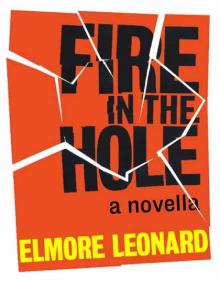 Fire in the Hole
Fire in the Hole Tishomingo Blues (2002)
Tishomingo Blues (2002)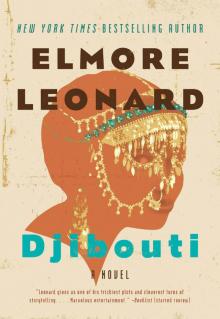 Djibouti
Djibouti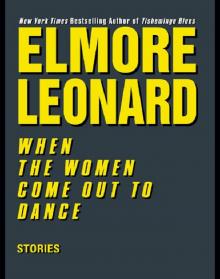 When the Women Come Out to Dance: Stories
When the Women Come Out to Dance: Stories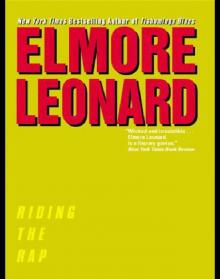 Riding the Rap
Riding the Rap Moment of Vengeance and Other Stories
Moment of Vengeance and Other Stories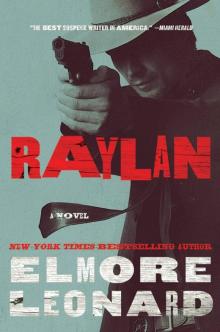 Raylan
Raylan Touch
Touch Mr Majestyk
Mr Majestyk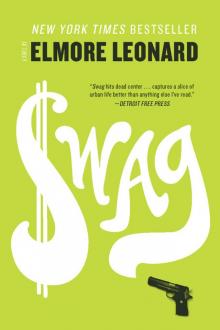 Swag
Swag Road Dogs
Road Dogs La Brava
La Brava The Hot Kid
The Hot Kid Valdez Is Coming: A Novel
Valdez Is Coming: A Novel Be Cool
Be Cool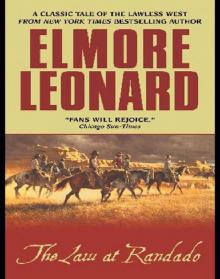 The Law at Randado
The Law at Randado The Bounty Hunters
The Bounty Hunters When the Women Come Out to Dance
When the Women Come Out to Dance 310 to Yuma and Other Stories (1953)
310 to Yuma and Other Stories (1953)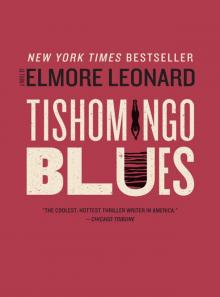 Tishomingo Blues
Tishomingo Blues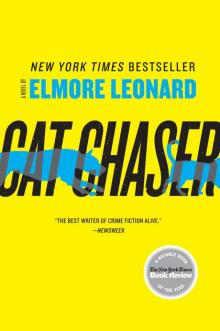 Cat Chaser
Cat Chaser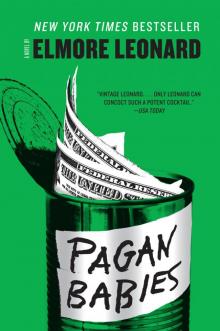 Pagan Babies
Pagan Babies Elmore Leonard's Western Roundup #1
Elmore Leonard's Western Roundup #1 52 Pickup
52 Pickup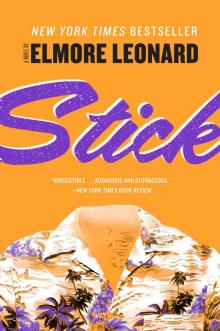 Stick
Stick The Moonshine War
The Moonshine War Valdez Is Coming
Valdez Is Coming City Primeval
City Primeval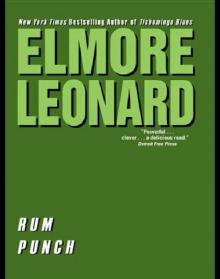 Rum Punch
Rum Punch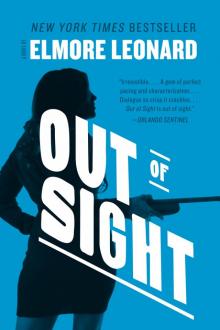 Out of Sight
Out of Sight Naked Came the Manatee (1996)
Naked Came the Manatee (1996) Killshot
Killshot Cuba Libre
Cuba Libre Forty Lashes Less One
Forty Lashes Less One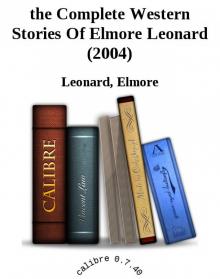 The Complete Western Stories of Elmore Leonard
The Complete Western Stories of Elmore Leonard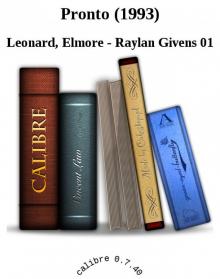 Pronto
Pronto Split Images
Split Images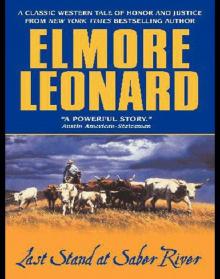 Last Stand at Saber River
Last Stand at Saber River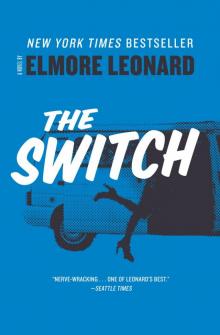 The Switch
The Switch Three-Ten to Yuma and Other Stories
Three-Ten to Yuma and Other Stories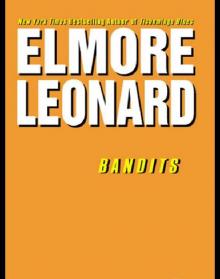 Bandits
Bandits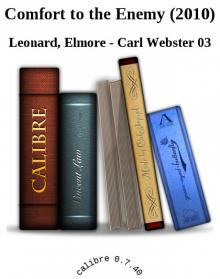 Comfort to the Enemy and Other Carl Webster Stories
Comfort to the Enemy and Other Carl Webster Stories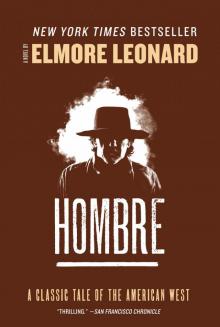 Hombre
Hombre Trail of the Apache and Other Stories
Trail of the Apache and Other Stories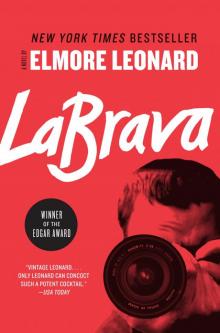 LaBrava
LaBrava Gold Coast
Gold Coast Jackie Brown
Jackie Brown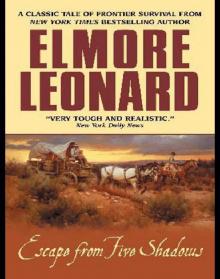 Escape From Five Shadows
Escape From Five Shadows Karen Makes out (1996)
Karen Makes out (1996)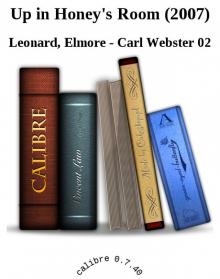 Up in Honey's Room
Up in Honey's Room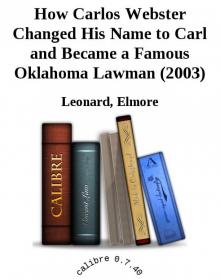 How Carlos Webster Changed His Name to Carl and Became a Famous Oklahoma Lawman (2003)
How Carlos Webster Changed His Name to Carl and Became a Famous Oklahoma Lawman (2003)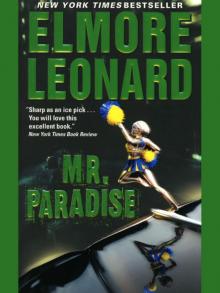 Mr. Paradise
Mr. Paradise The Hunted
The Hunted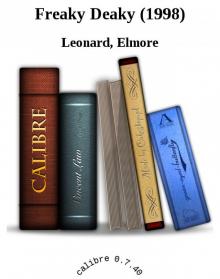 Freaky Deaky
Freaky Deaky Louly and Pretty Boy (Ss)
Louly and Pretty Boy (Ss)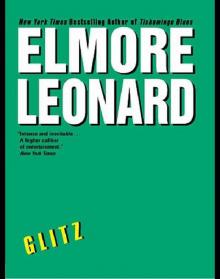 Glitz
Glitz A Coyote's in the House
A Coyote's in the House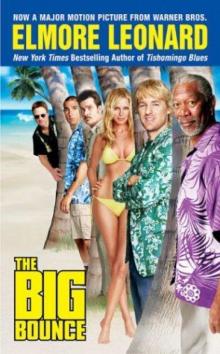 The Big Bounce jr-1
The Big Bounce jr-1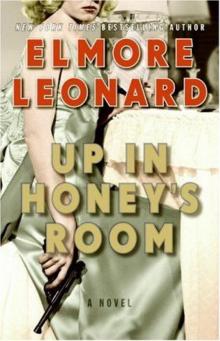 Up in Honey's Room cw-2
Up in Honey's Room cw-2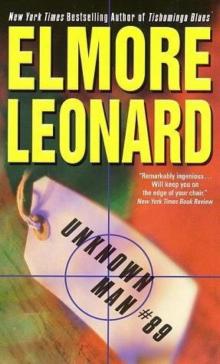 Unknown Man #89 jr-3
Unknown Man #89 jr-3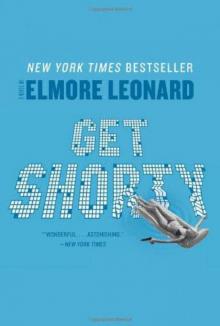 Get Shorty: A Novel cp-1
Get Shorty: A Novel cp-1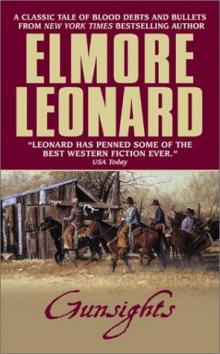 Gunsights
Gunsights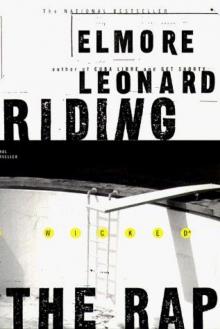 Riding the Rap rg-2
Riding the Rap rg-2